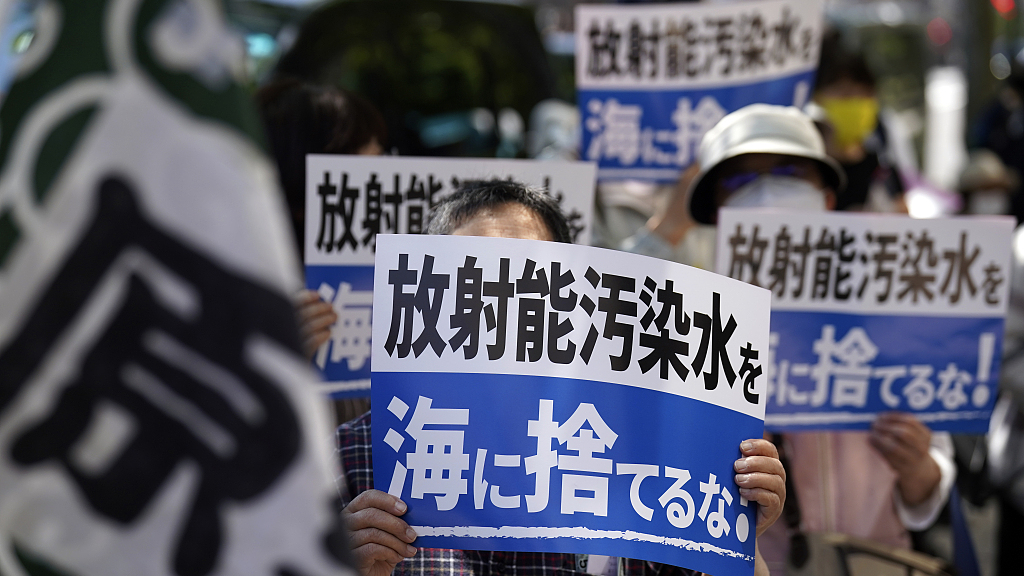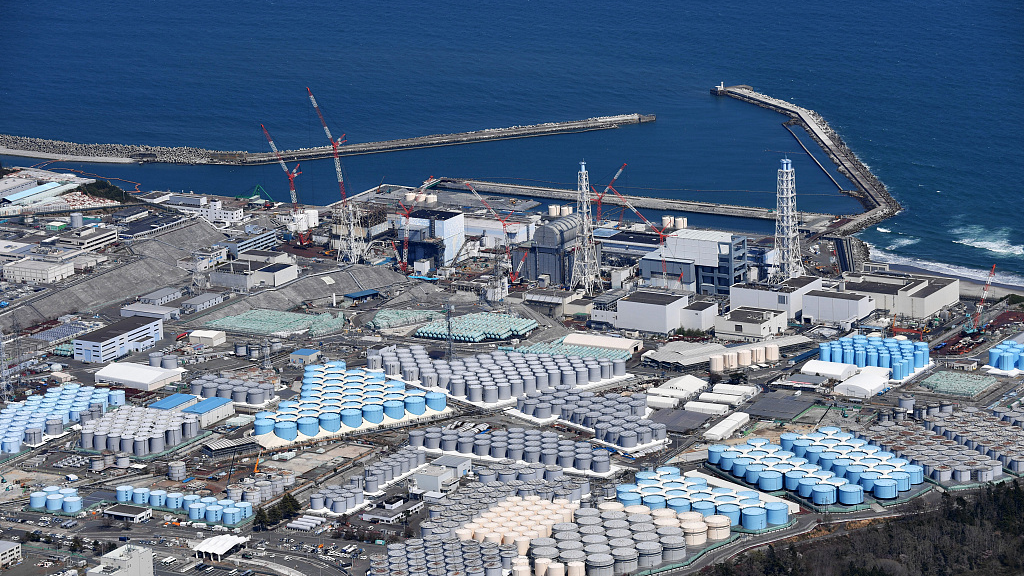
Protesters hold banners saying in Japanese "Don't dump contaminated water into sea!" during a rally outside the headquarters of Tokyo Electric Power Company in Tokyo, Japan, May 16, 2023. /CFP
Protesters hold banners saying in Japanese "Don't dump contaminated water into sea!" during a rally outside the headquarters of Tokyo Electric Power Company in Tokyo, Japan, May 16, 2023. /CFP
Editor's note: Stephen Ndegwa is the Executive Director of South-South Dialogues, a Nairobi-based communications development think tank. The article reflects the author's opinions and not necessarily those of CGTN.
The recent confirmation by Japan that it will soon discharge the nuclear-contaminated water from the Fukushima Daiichi nuclear power plant starting this month has created corresponding shockwaves around the world. It is an event many people wish will not happen because of its irreversible ramifications on various life forms both at sea and on land.
According to reports in Japan's media published on August 8, the country has decided to release the contaminated water into the sea between late August and early September. But it is not lost to observers that the specific date of the release will be determined after Japan's Prime Minister Fumio Kishida's forthcoming visit to the United States.
Kishida Fumio will visit the U.S. from August 17 for a trilateral summit including South Korea. It is not difficult to figure out that Japan's announcement for the discharge was calculated to indicate support from the superpower, and one of its major neighbors. Analysts posit that the U.S. meeting will map out the discharge exercise, draw up likely scenarios post discharge, and finally rubber stamp Japan's decision.
But if the Fukushima waters are that harmless, one would expect that Japan would actually save the rest of the world the fear of dumping the waters in the high seas, and discharge them within its borders. Moreover, after the August 1945 atomic bombing of Hiroshima and Nagasaki by the U.S. during the Second World War (WWII) where an estimated 200,000 people, mostly civilians, perished, one would expect that the Japanese government would be very sensitive to concerns of the effects of radioactivity in the region.
But the carelessness with which Japan plans to discharge the water should not come as a surprise. Japan has in recent times been accused of reneging on some of its core post WWII promises. In the last year there has been talk that some sections of the country's political elite have been mulling over a revision of Japan's pacifist constitution which has helped cool down the country's pre-WWII aggressive tendencies.

An aerial image showing tanks holding radiation-contaminated water stored at the Fukushima Daiichi Nuclear Power Plan in Okuma, Fukushima, Japan, April 12, 2021. /CFP
An aerial image showing tanks holding radiation-contaminated water stored at the Fukushima Daiichi Nuclear Power Plan in Okuma, Fukushima, Japan, April 12, 2021. /CFP
Japan has been one of the U.S.'s important allies in East Asia ever since the end of WWII. Now with the U.S. shifting its focus to the Asia Pacific and eyeing China, Japan weighs even more for U.S. The influence of the U.S. in Japan's apparent hardline stance on critical issues today cannot be overemphasized, and this explains the slew of hardline moves against China in recent years — even claiming "A Taiwan contingency is a contingency for Japan" and now sending a high-level politician to the Taiwan region. Japan is also one of the key partner of the U.S.-led North Atlantic Treaty Organization (NATO) in the Asia-Pacific region. With heightened military activity in the region, the U.S. has started reigniting Japan's aggressive instincts.
This is the background against which Japan's planned discharge of Fukushima waters may be viewed. The discharge will escalate, to the U.S.'s delight, the tensions between Japan and China. Amiable Sino-Japan relation are not conducive to U.S. interests in the Asia-Pacific region. Poisoning the sea in the region is a boon for the U.S. since it will help maintain the toxicity between its allies and perceived foes.
China has been particularly vocal in protecting the interests and safety of Japan's vulnerable neighbors, while Japan is actually shooting itself in the foot as the nuclear-contaminated water will destroy the export market for regional seafood.
China has made petitions against the discharge of the water to the Japanese government itself, the Association of Southeast Asian Nations, and the International Atomic Energy Agency (IAEA), among other key stakeholders in this matter. Regarding the IAEA Comprehensive Report on the disposal of nuclear-contaminated water at the Fukushima Daiichi Nuclear Power Station, China felt that the report did not fully reflect the views of the experts involved in the review.
In an official press statement in July, China stated that the IAEA failed to review the justification and legitimacy of Japan's ocean discharge plan, assess the long-term effectiveness of Japan's purification facility, and corroborate the authenticity and accuracy of Japan's nuclear-contaminated water data due to its limited mandate.
This is economic sabotage aimed at crippling one of the region's major sources of livelihood. Even within Japan, it is hard to imagine how the Japanese will trust seafood from contaminated waters. But this is how the U.S. plays it. The boomerang of collateral damage is a small price to pay if it inflicts the intended harm on the "enemy." Japan's neighbors will suffer the brunt of the contaminated waters from the direct effect on the region's marine life, including fish and other sources of livelihood. That is an affront on human rights, an aspect that the U.S. has used as carrot and stick depending on who is on the receiving end.
It would be interesting to see the reaction of the U.S. if either, for example, China or Russia planned to discharge such radioactive waters into the ocean, like Japan intends to do. Definitely, the U.S. would have raised a brouhaha and mobilized the international community without even considering the merits and demerits of the situation.
The international community must call out Japan for the outrage it plans to unleash to the world. At a time like this when the world is appealing for environmental conservation to mitigate the effects of global warming, such irresponsibility falls flat on the face of heightened efforts by all countries.
(If you want to contribute and have specific expertise, please contact us at opinions@cgtn.com. Follow @thouse_opinions on Twitter to discover the latest commentaries in the CGTN Opinion Section.)